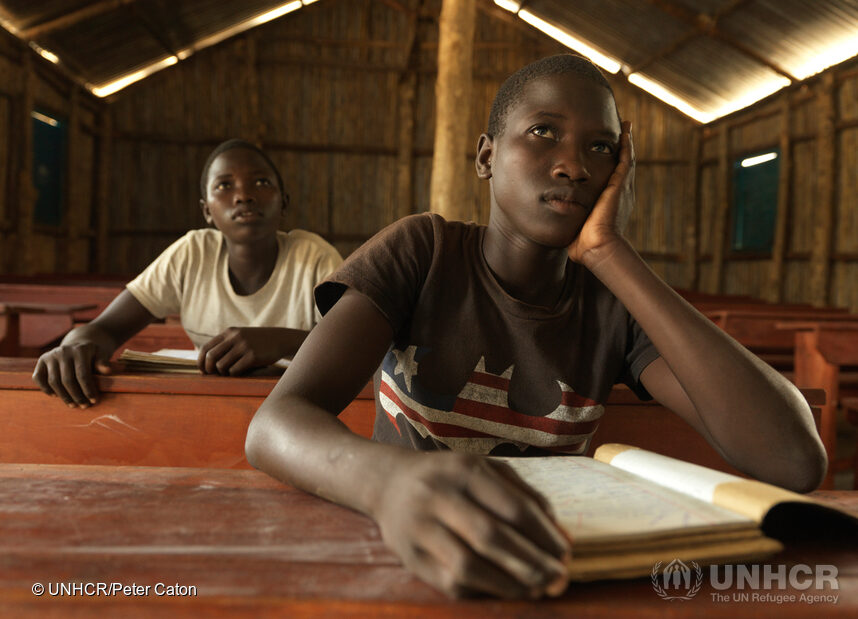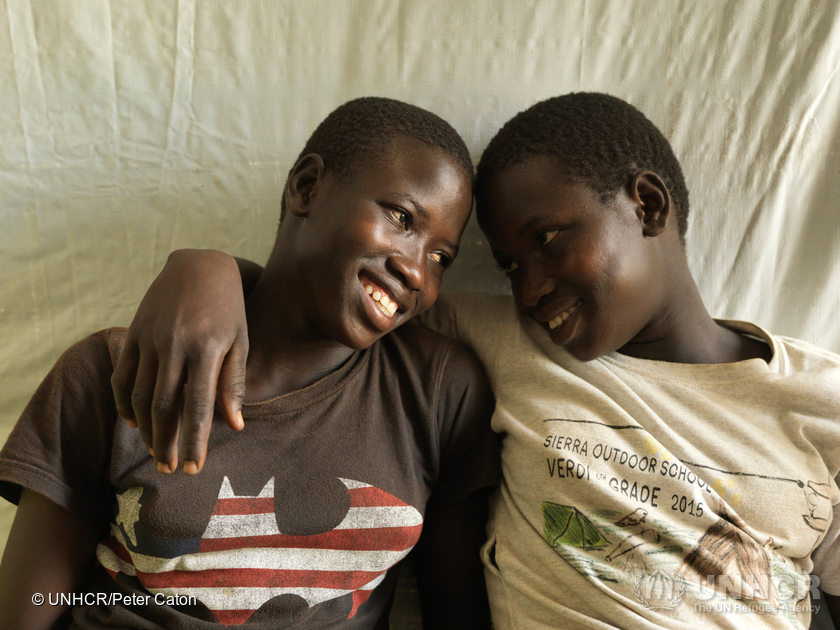In Africa’s largest and most complex emergency, the South Sudan crisis, almost 90 per cent of those fleeing are women and children. Funding to UNHCR’s South Sudan operation from the Norwegian Government ensures that young South Sudanese refugee women and girls can attend and stay enrolled in school.

Uganda. Over en million flyktninger fra Sør-Sudan har flyktet til Uganda etter at kamphandlinger blusset opp igjen. UNHCRs skole ved Imvepi-bosetningen i Uganda. Tabu Sunday (til høyre) ble symbolsk utnevnt til flyktning nummer én million på flukt fra Sør-Sudan til Uganda. Hun og søsteren Rena er glad for å få gå på skole, selv om Tabu påpeker at overfylte klasserom og mangel på skolebøker er et problem.
The South Sudan crisis has claimed thousands of lives, and forced two million to seek refuge elsewhere in the country. Neighbouring Sudan and Uganda are hosting the majority of the more than two million South Sudanese people that have fled to seek safety across the border.
Fourteen year old Tabu Sunday fled to Uganda with her siblings after fighting broke out in her town Yei, in South Sudan. Seeking sanctuary and determined to continue her education, she travelled by foot through Congo before she reached Uganda.
“Where I was living they were killing people,” says Tabu. “My parents said they didn’t have enough money for travelling. So we had to walk on foot with my aunt. ”
The Government of Uganda has maintained open borders upholding an inclusive approach that grants refugees freedom of movement, the right to seek employment and establish businesses, and access public services such as education, on equal terms with nationals. However, urgent and massive support is still needed.

Tabu Sunday (left), the symbolically named one millionth South Sudanese refugee to arrive in Uganda with her twin sister Rena in their shelter at the Imvepi settlement.
In times of displacement, education is crucial to achieve peaceful and sustainable development. In Uganda, Tabu is now attending classes. Despite the fact that she has to share a classroom with another 200 students, Tabu remains optimistic that her dreams of becoming a doctor or midwife can be fulfilled.
“I want to be a doctor because when someone falls sick, or a woman needs to deliver a baby, I can help.”
Norway is among the top government donors to the South Sudan Regional Refugee Response Plan, having contributed with USD 6.7 million (NOK 56 million) in 2017. The funding is spent on addressing urgent needs in South Sudan and the host countries Uganda, Sudan, Ethiopia, Kenya, the Democratic Republic of the Congo and the Central African Republic.
“Without support from countries such as Norway, young girls like Tabu, will miss out on opportunities in the future. Ensuring that South Sudanese refugees receive access to education is an integral part of the refugee response operation. It protects vulnerable girls and children and enables a place of positive transformation. Many of these children have witnessed horrific acts of violence, they may be former child soldiers or survivors of sexual abuse. Norway is a firm supporter of the peace effort in South Sudan, and important donor to UNHCR and our partners” says Wilfried Buchhorn, acting UNHCR Regional Representative for Northern Europe.
The South Sudan situation is critically underfunded. Below is a list with implications for a lack of additional funding:
Source: Highlighted Underfunded Situations in 2017
Norway-South Sudan policy:
Share on Facebook Share on Twitter